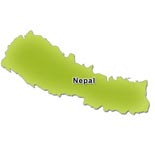UN urges restraint as Nepal's Maoist strike turns violent
 Kathmandu, Dec 21 - An alarmed UN called for restraint as the general strike enforced by Nepal's former Maoist guerrillas entered the second day Monday amidst reports of widespread violence.
Kathmandu, Dec 21 - An alarmed UN called for restraint as the general strike enforced by Nepal's former Maoist guerrillas entered the second day Monday amidst reports of widespread violence.
Police said 72 protesters were arrested and almost an equal number of people, including security forces, injured while more than a dozen vehicles were vandalised and shops and industries attacked.
Nepal's Prime Minister Madhav Kumar Nepal, who returned from the Copenhagen climate summit Sunday, headed for a hospital in the capital to enquire about the condition of a deputy superintendent of police, Dilli Chaudhary, who sustained serious head injuries during clashes and is said to be in critical condition after an emergency operation.
"I call on all groups to exercise restraint, to avoid provocation and to reduce tension through dialogue," the UN's top human rights official in Nepal, Richard Bennett, said in a press statement.
Bennett, who heads the Office of the UN High Commissioner for Human Rights in Nepal, said the display of violence was "some of the worst on the streets of Kathmandu for several years, perhaps since Jana Andolaan-II (the pro-democracy protests against deposed king Gyanendra's army-backed reign in 2006)".
"It must not be repeated and those responsible should be held to account," the UN official said.
Despite the appeal, tension continued to simmer nationwide Monday, on the second day of the three-day general strike called by the Maoists, who rejected an appeal by the prime minister to end the protests and return to talks.
At least six vehicles had been attacked in the morning while hundreds of supporters, mostly young men, continued to patrol roads and highways, waving party flags and flourishing batons.
Thousands of people were stranded on the highways leading to India due to the disruption in transport. Indians who had come to Nepal's border towns in the southern Terai plains for medical treatment, work or to meet family members, were left in the lurch by the general strike, unable to return.
Thousands of Nepali labourers, either bound for Indian border towns or returning home from there, also faced great hardship.
The Chamber of Commerce and Industries in Birgunj, the hub of India-Nepal trade in the country, issued a statement Monday, asking workers to report for work and warning it was implementing a no work, no pay-policy for the three days of the general strike.
Nepal's state media said the closure was costing the buffeted economy a loss of Nepali Rs. 1.2 billion daily with wage workers being the hardest-hit.
The Maoists, the largest party in Nepal after winning an election last year, began the protests to force the government into revoking the decision taken by President Ram Baran Yadav, which led to the fall of their eight-month government in May.
The Maoists, once a guerrilla party that waged a 10-year war against the government to abolish monarchy, tried to sack the chief of the army, Gen Rookmangud Katawal, for insubordination, but were foiled by the president, who re-appointed the general.
Since then, the former insurgents have been spearheading protests against the new communist-led government, saying the president, a titular head of state, acted unconstitutionally.
The renewed war of attrition between the former rebels and the ruling parties has cast a shadow over the fragile peace process that began in 2006, with the insurgency ending and both sides agreeing to enforce a pro-people constitution by May 2010.
While the ruling parties say the May deadline will be met, the Maoists are predicting failure and the imposition of emergency, followed by military rule. (IANS)